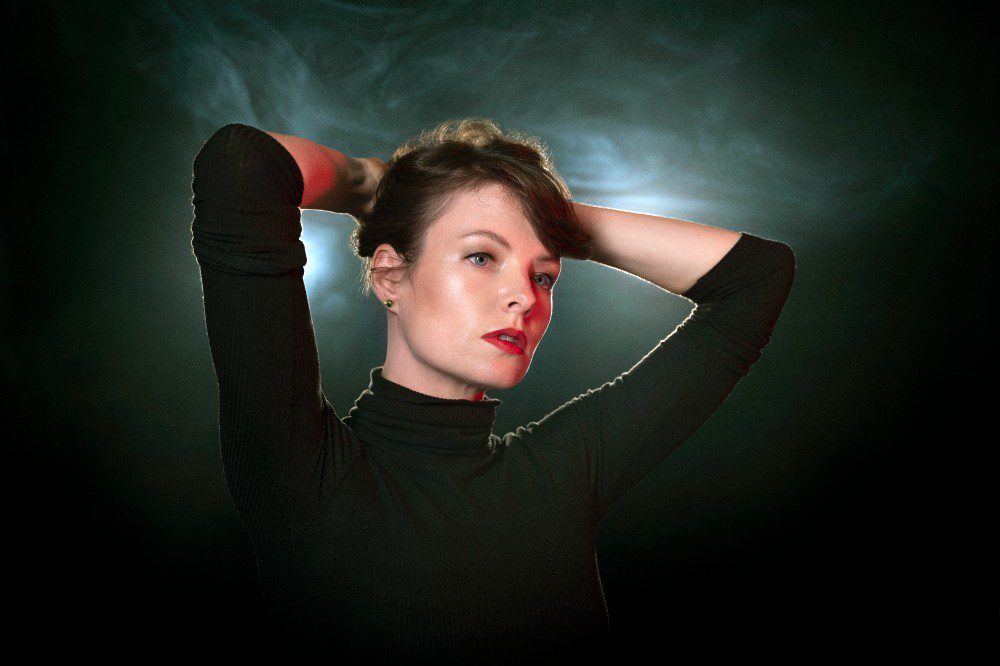

Earlier on in the COVID-19 pandemic, Megan Louise and Johnny Jewel, of the duo Desire and record label Italians Do It Better, decamped to Palm Springs from Los Angeles. They settled into what Louise describes as a “perfect little mid-century gem” with their daughter and got to work on what would become their latest album, Escape.
“We really isolated, me and him and our daughter,” says Louise on a recent Zoom call. “We were in the house and from 9 to 5; we had all this time, suddenly, where we were making sound banks and going through every single keyboard we own.”
They combed through dozens of analog synthesizers, banking the best sounds they found and started building songs. Meanwhile, they were also watching movies nightly, digging deep into horror, like 1981 slasher flick Happy Birthday to Me and Italian giallo films. They found aesthetic inspiration in Dario Argento’s work. “When we were developing our music videos, they were a massive influence from the coloring to the styling to the makeup,” says Louise.
All of that coalesced into Escape, released May 3, which melds eerie, cinematic atmospheres with pop song hooks and club-friendly dance beats. “We like to say there’s one foot in the cemetery and one foot on the dance floor,” quips Louise. The album is augmented by a collection of eight music videos, the last two of which will premiere in New York on May 27 as part of a screening/live performance event at Roxy Cinema, which has already sold out.
As a teenager in Montreal, Louise dove into various behind-the-scenes music pursuits. She was 17 when she helped launch a jam space and recording studio inside an old textile factory, 19 when she opened the club Zoobizarre. The club was popular — Peaches, James Murphy and Justice were just a few of the artists who came through the venue — and, through her promotion work, she met Jewel. Louise was also playing with friends in a tribute band who focused on the work of French prog rock musician Jean-Pierre Massiera. When Jewel saw her perform, he suggested that they play together. “After falling in love and creating Desire, he wrote ‘Under Your Spell,’” Louise recalls. “Under Your Spell” became Desire’s most recognizable track after it was featured in Drive, Nicolas Winding Refn’s 2011 movie that went on to be a musical and aesthetic touchstone for the next decade. Meanwhile, Desire started to tour and Louise took on much of the business responsibilities for Italians Do It Better, becoming the indie label’s president.
“I guess there are two sides of me. One side is really creative and one side is really business-oriented,” she says. That duality has given her a very specific vantage point in seeing the shifts within the music industry as the streaming era took shape. “I remember being like, what is this new thing called Spotify? We were still selling a ton of CDs back then,” she says.
“Seeing the shift has been the most interesting thing, which has affected us in terms of not taking things too seriously,” says Louise. “For us, it’s still all about the art. We are making records that we want to do that we make for ourselves first.”
She adds, “The way that streaming is going, the way that artists are being paid out, it’s just really difficult and it can be kind of demoralizing in some ways, but that’s not why I’m doing it. It’s truly the deepest passion that I have and I want to keep going and keep doing it as long as I can.”
While working on the album, Louise landed a DJ residency at Palm Springs’ Ace Hotel. She describes her DJ sets as “sugary” and eclectic. She might bring together a cover of “Barbie Girl” from duo Mothermary, who are associated with Italians Do It Better, a Donna Summer disco jam and an African tune that’s been flying under the radar on Spotify. “I’ll jumble it all up and have one big party vibe going,” she says.
Louise’s DJ sets went on to influence Escape as well. “It really brought a lot of depth to adding dance music elements, having so much music around us and having to do so much research for DJing for five hours,” she says.
Desire also squeezed in a few collaborations while working on the album, including a cover of “Can’t Get You Out of My Head” with Guy Gerber that was released this past January.
Escape includes a few collaborations as well, like contribution from Ether, the musical alias of model Soo Joo Park, who sings on the cover of the Korean song “Haenim.” The collaboration began as part of a television project Louise had previously been developing. Another featured artist on the album, Mirage, who appears on “Love Is a Crime,” is actually Jewel’s solo project. “It’s the last track that we finished because we couldn’t put the finger on what was missing,” says Louise of the song. “Johnny got on his vocoder and recorded the lyrics and I was like, oh my God, this is it.”
Another key collaboration was with Vaughn Oliver, who mixed the album. “We’re obsessed with what he’s done with Kim Petras and Chromeo, so we really wanted that sound,” says Louise. “I don’t even know what he does, but it’s genius. We were delivering stems and it was taking weeks for him to finish each song, but we were very patient and beyond happy with the result of what he brought to the record.”
Included in the collection is a cover of the theme from the long-running soap opera Young and the Restless. “That was a really special song for us,” says Louise. She recalls her response to hearing the instrumental that Jewel had initially made. “He presented it to me. I was like, oh my God, you have no idea how much this means to me,” she says. “Me and my father, we watched soap operas. He passed away when I was 12, so I’ve been very marked by soap operas.”
Louise then showed Jewel a live performance of the song with David Hasselhoff, who played Dr. Snapper Foster on Young and the Restless in the 1970s, singing. “That inspired our version of adding the lyrics,” she says.
By the end of recording, they had 24 tracks to choose from, whittling that down to the 13 songs that appear on Escape. She says, “We just made the best album that we could possibly assemble with what we had at the moment.”
Follow Desire on Instagram for ongoing updates.


